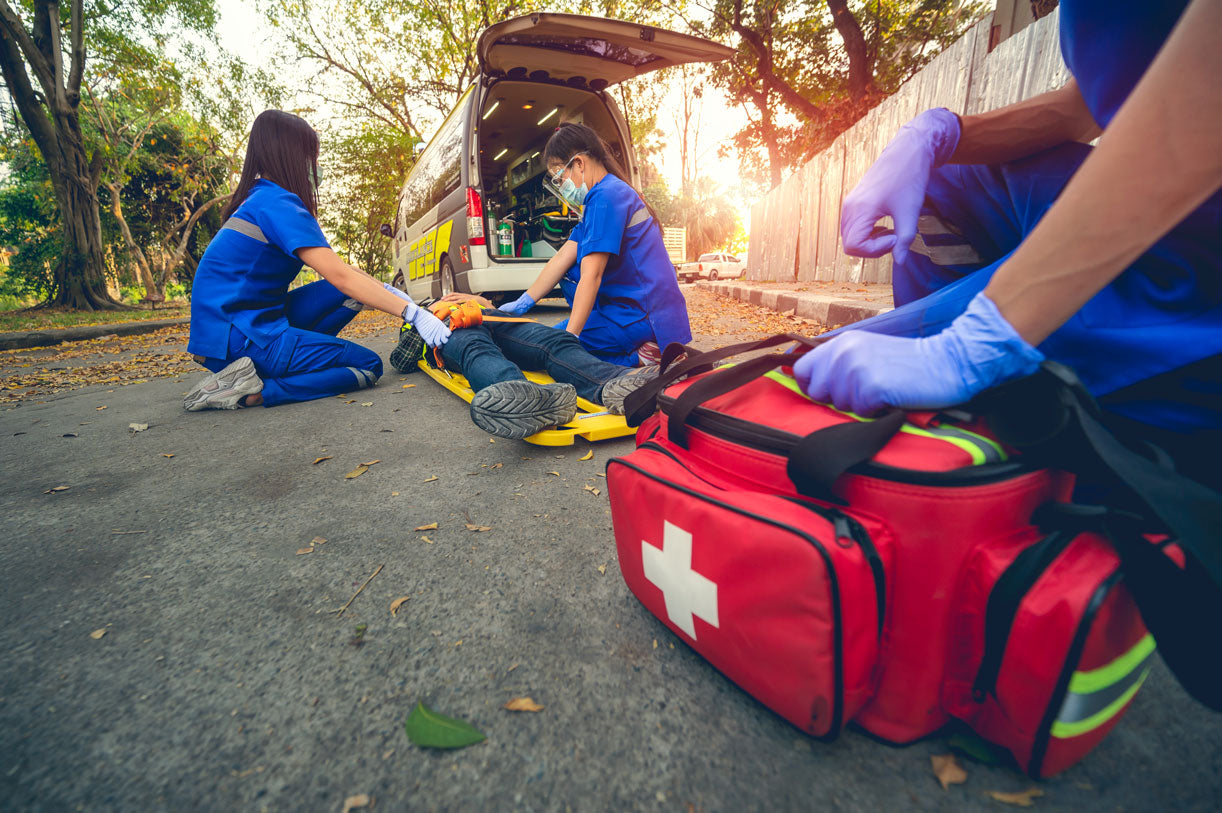513-247-2001
513-247-2001

Emergencies can strike at any time, and being prepared is crucial for ensuring the safety and well-being of everyone in your workplace. One of the key components of emergency preparedness is having the right medical supplies on hand. In this blog, we will explore the must-have emergency medical supplies for various workplace sectors, including entertainment venues, transport hubs, places of worship, and education. Each sector presents unique challenges, but a well-equipped first aid kit can make a significant difference in providing immediate care until professional help arrives.
Almost every day, we see and hear about civilians who suffered traumatic injuries following an accident or intentional attack: 35% of pre-hospital fatalities are due to bleeding from a traumatic injury. We know that Defibrillators and Fire Extinguishers are placed in malls and schools etc. as standard, and Military and Emergency Medics agree with the inclusion of bleeding control equipment in public spaces to be equally valid.
Firstly, whether it’s a workplace, somewhere you are visiting or home, you should always consider having appropriate emergency medical supplies, as you never know what is going to happen. Being prepared is vital, as you will have the confidence to act and potentially save lives.

Whether it's a concert, sports event, or theater performance, entertainment venues attract large crowds where unexpected medical incidents can occur. A high-profile example of a serious incident at an entertainment venue includes the tragic Ariana Grande concert in Manchester, 2017, where 22 people including children were killed. This horrific event was the result of an intentional terrible act. If there is anything we can learn from these terrible events, it’s that well-stocked emergency medical supplies in these settings are absolutely essential. Having these supplies readily available ensures that immediate care can be administered to individuals experiencing severe bleeding, injuries, illnesses, or cardiac emergencies during events.
Airports, train stations, and bus terminals are bustling with people, making them susceptible to accidents and health-related issues. Any place which has a large crowd is always at a higher risk of many kinds of injuries. Another factor to take into consideration is that places such as subways are usually on lower levels where stairs will be needed. This adds extra challenge to first responders trying to access an injured person, where in severe cases every minute counts.
Equipping transport hubs with emergency medical supplies such as bleeding control kits and stations enables quick response to injuries, cuts, or motion-related discomfort, ensuring the safety and well-being of travelers.
Religious gatherings bring communities together, but they also pose the risk of medical emergencies. Places of worship can contain large gatherings of people in one place, therefore the importance of a well-equipped first aid kit is essential to save multiple lives at once if necessary.
Schools and universities are dynamic environments with diverse activities, creating a need for comprehensive first aid resources. Unfortunately in the US the list of school shootings over the past few years has been increasing.
A recent tragic event has occurred in Iowa on the first day of school, where a heroic principal has died putting himself in harm's way to protect the students of the school. Sixth-grader Ahmir Jolliff, 11, was also killed, and seven others were wounded, two other school staff members and four students. Read the full story here.
Due to the unsettling increase in such events, it is vital to have the appropriate medical training and emergency preparedness to save lives of all ages.

At TyTek Medical we are committed to responding to recent medical events and listening to what is needed to save lives, which is why we created the MCI (Mass Casualty Incident) Bag. Recent medical research has revealed that there is a ‘Platinum Ten-Minute’ period after a mass casualty incident. If you can react effectively in this time you will be able to save lives.
Categorically, nobody before us in the emergency medical industry has designed a trauma kit that folds out to allow side-by-side working with added extendable floodlights. This unique feature takes care of poor visibility and frees the hands of rescuers while bringing order to a chaotic situation.
Hand-picked by medical professionals, the contents in each kit bag are designed to service multiple patients and most of the materials within them are applicable for basic skill level use, especially controlling a catastrophic bleed.
Take a look at the contents here and register your interest to have one of these innovative kits in your workplace.
No matter the workplace setting, having the right emergency medical supplies is crucial for safeguarding the health and well-being of employees, patrons, and visitors. Investing in well-equipped emergency medical supplies and ensuring that staff members are trained in basic first aid can make a significant difference in responding effectively to unforeseen medical emergencies. By prioritizing preparedness, workplaces can create a safer environment for everyone.
If you would like to find out more about becoming medically prepared, or stock some of our medical supplies in your inventory, please get in touch with our team as well as following us on our social media to stay up to date.